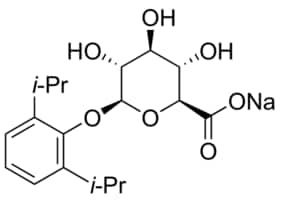R-026
Remifentanil acid solution
100 μg/mL in acetonitrile, certified reference material, Cerilliant®
About This Item
Recommended Products
grade
certified reference material
Quality Level
form
liquid
feature
Snap-N-Spike®/Snap-N-Shoot®
packaging
ampule of 1 mL
manufacturer/tradename
Cerilliant®
concentration
100 μg/mL in acetonitrile
technique(s)
gas chromatography (GC): suitable
liquid chromatography (LC): suitable
application(s)
forensics and toxicology
format
single component solution
storage temp.
−20°C
InChI
1S/C19H26N2O5/c1-3-16(22)21(15-7-5-4-6-8-15)19(18(25)26-2)10-13-20(14-11-19)12-9-17(23)24/h4-8H,3,9-14H2,1-2H3,(H,23,24)
InChI key
GFJKFSFFMHOISI-UHFFFAOYSA-N
Related Categories
General description
Application
- Glycogen synthase kinase-3 beta inhibition prevents remifentanil-induced postoperative hyperalgesia via regulating the expression and function of AMPA receptors: This study investigates the mechanisms behind remifentanil-induced hyperalgesia, using remifentanil acid as a key component to understand pain modulation post-surgery. The findings are essential for developing targeted pain management therapies in postoperative care, making it a crucial study for researchers in pharmaceutical and analgesic drug development (Li et al., 2014).
- Quantitative measurement of blood remifentanil concentration: development of a new method and clinical application: This research develops a new methodology for quantifying blood levels of remifentanil, providing insights into its pharmacokinetics and pharmacodynamics. This method is significant for clinical settings where precise dosing and monitoring are crucial, offering valuable data for pharmacological research and safe anesthetic practices (Kudo et al., 2013).
- Erasure of a spinal memory trace of pain by a brief, high-dose opioid administration: This groundbreaking study explores the potential for high-dose opioids like remifentanil to erase painful memories at the spinal level, potentially revolutionizing approaches to chronic pain management. This research is of paramount importance to neuroscientists and clinical researchers focusing on new therapeutic strategies for pain relief (Drdla-Schutting et al., 2012).
- Distinct mechanisms underlying pronociceptive effects of opioids: This study further elucidates the complex mechanisms by which opioids like remifentanil may exacerbate pain under certain conditions. By exploring the molecular interactions involved, this research contributes to a deeper understanding of opioid pharmacology and aids in the development of better analgesic agents with fewer side effects (Heinl et al., 2011).
- Opiate-induced dopamine release is modulated by severity of alcohol dependence: an [(18)F]fallypride positron emission tomography study: This innovative study uses remifentanil to examine how opioid administration affects dopamine release in subjects with varying levels of alcohol dependence. The results are critical for understanding addiction and developing personalized treatment strategies that consider underlying co-dependencies (Spreckelmeyer et al., 2011).
Legal Information
related product
Signal Word
Danger
Hazard Statements
Precautionary Statements
Hazard Classifications
Acute Tox. 4 Dermal - Acute Tox. 4 Inhalation - Acute Tox. 4 Oral - Eye Irrit. 2 - Flam. Liq. 2
Storage Class Code
3 - Flammable liquids
WGK
WGK 2
Flash Point(F)
35.6 °F - closed cup
Flash Point(C)
2.0 °C - closed cup
Certificates of Analysis (COA)
Search for Certificates of Analysis (COA) by entering the products Lot/Batch Number. Lot and Batch Numbers can be found on a product’s label following the words ‘Lot’ or ‘Batch’.
Already Own This Product?
Find documentation for the products that you have recently purchased in the Document Library.
Our team of scientists has experience in all areas of research including Life Science, Material Science, Chemical Synthesis, Chromatography, Analytical and many others.
Contact Technical Service









